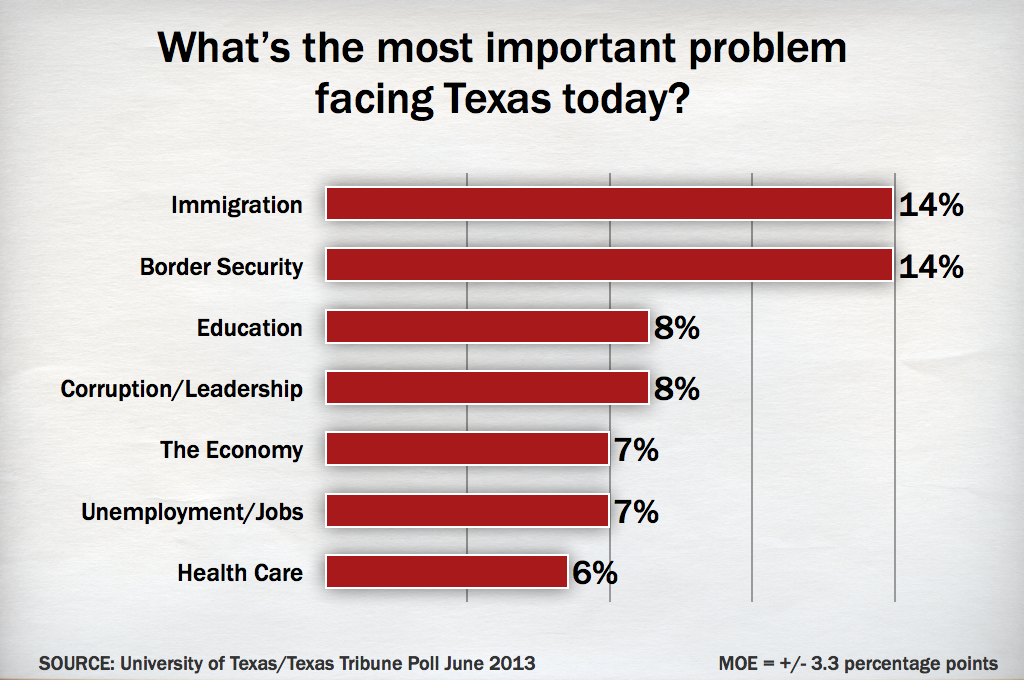UT/TT Poll: Rising Concerns Over Political Corruption, Leadership
/https://static.texastribune.org/media/images/2013/06/18/UT-TT-Poll-Wed.368_1.png)
The issue of political corruption and leadership is quickly rising on Texans’ list of top problems facing the country, according to the latest University of Texas/Texas Tribune Poll.
That item rose to second on the list of national problems in the latest poll — behind the economy — and among conservatives, it ranked at the top.
Immigration and border security continue to top the list of the state’s most important problems, followed by education and political corruption/leadership.
“You break those numbers down and on a partisan basis, the political corruption/leadership is actually the No. 1 most important problem nationally for Republicans,” said Jim Henson, co-director of the poll and head of the Texas Politics Project at the University of Texas at Austin. “For Democrats, it was much lower, in the single digits.”
The second-term problems of the Obama administration are making themselves manifest,” he added. “While we were in the field, it was the IRS thing and also, with some conservatives, Benghazi and Libya.
The economy, paired with unemployment/jobs, has dominated the national list over the last several UT/TT surveys, and those remain two of the top four items on the list. Those two issues lie further down the Texas list. Federal spending/national debt, health care and partisan gridlock round out the top of the national list.
“I don’t ever remember leadership, corruption, these sorts of issues, hitting double digits,” said Daron Shaw, c0-director of the poll and a government professor at UT-Austin. “It’s psychological, but it’s real.”
Texans’ assessment of the course of the country hasn’t changed significantly since the previous UT/TT Poll in February, with 60 percent saying the country is on the wrong track and only 28 percent saying it is going in the right direction. In February, those numbers were 62 percent and 29 percent, respectively.
The Texas numbers have brightened, with 50 percent saying the state is going in the right direction and 32 percent saying things are on the wrong track. Earlier this year, 45 percent chose right direction and 39 percent chose wrong track.
“Given the scandals during the last couple of weeks, I thought these numbers were pretty good,” Shaw said of the national numbers. “The right direction number is pretty low.
“The state number, honestly, is partly the economy,” he said. “I’ll bet there’s a little bit of state pride here: ‘How’s Texas doing? Texas is great, dammit.’”
Just more than one-third of Texas voters said the national economy is better off than it was a year ago, and almost as many said the country is worse off. Most don’t feel strongly either way, with 7 percent saying the economy is a lot better off and 15 percent saying it is a lot worse off. A large number — 31 percent — said the economy is about the same as it was this time last year.
Asked about their own prospects, 44 percent said they and their family are in about the same shape economically as a year ago, while 25 percent said they are better off and 30 percent saying they are worse off.
“This suggests an economy that is just sort of bumping along,” Shaw said.
The University of Texas/Texas Tribune internet survey of 1,200 voters was conducted May 31-June 9, 2013, and has a margin of error of +/- 2.83 percentage points. Numbers in the charts might not add up to 100 percent, because of rounding.
This is the third of five stories on the latest University of Texas/Texas Tribune Poll. Monday: head-to-head races for president, governor and lieutenant governor. Tuesday: What voters think of top political figures and institutions. Tomorrow: issues and the Texas Legislature.
Texas Tribune donors or members may be quoted or mentioned in our stories, or may be the subject of them. For a complete list of contributors, click here.
Information about the authors
Learn about The Texas Tribune’s policies, including our partnership with The Trust Project to increase transparency in news.


/https://static.texastribune.org/media/profiles/ramsey-ross_TT.jpg)